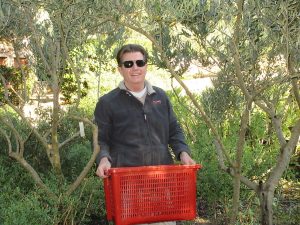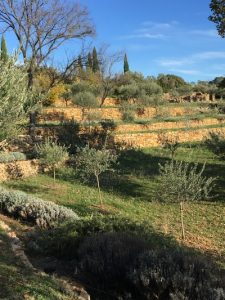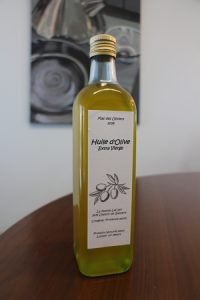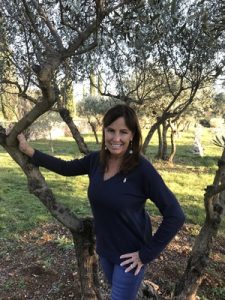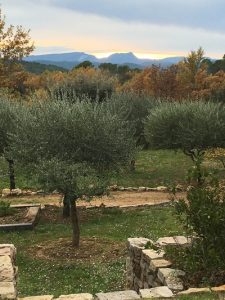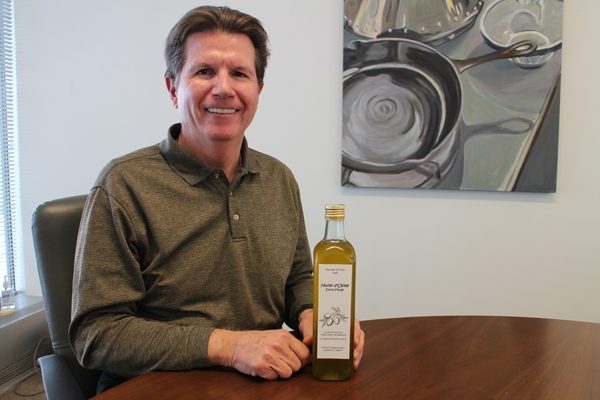
Gary LeClair with a bottle of the extra virgin olive oil produced from his farm in France. (Jonathan Spiers)
If you couldn’t tell by his surname, Gary LeClair – one of the co-founders and namesakes of downtown law firm LeClairRyan – is of French descent, French Huguenot specifically.
It’s that heritage, along with an interest in history and all things French, that led LeClair and his wife April to buy a small olive farm in Provence along the French Riviera, where they spend much of their time tending the trees and growing the olives that they then have pressed to produce their own extra virgin olive oil, which they bottle themselves.
Still a practicing attorney in the firm’s economic development, M&A and other practices, LeClair, 63, purchased the 250-tree farm in 2013, in between stepping down from his leadership roles as CEO in 2011 and as chairman in 2015 – freeing him up to join April, who spends half the year there, on trips that can include business stops in London.
For LeClair, the farm allows him to reconnect with his heritage, travel Europe and, most important, keep busy as he inches closer to retirement.
“When 65 was set as the normal retirement age, average life expectancy in the U.S. was 63,” he said, laughing. “Now, if you make it to age 65, there’s a pretty good chance you’ll make it to 90.
“We weren’t constructed as human beings not to be active, so it’s important to have a project. Given my heritage and the desire to have a project, and some of my family history was farming, this had a real emotional tug for me – to go back to France and to farm, if you will.”
LeClair said he travels to the property about six times a year, spending an average of three weeks per trip tending the farm, working the land and living the rustic life in their “mas,” or Provencal farmhouse, which they named Mas de Oliviers – French for “farmhouse of olive trees.”
While Provence may be better known for its wine-producing grapes, LeClair was strategic in opting for olives.
“The great thing about olive trees is it’s hard to kill. They live for hundreds of years,” he said. “The grape industry is more heavily regulated and takes a lot more care and time. Even a neophyte lawyer like me can’t kill an olive tree.”
Nonetheless, the farm does require physical labor that LeClair said tests his limits and reminds him of his age.
“So far, I’ve torn my biceps, I’ve partially torn my rotator cuff, I have fallen off a ladder. I usually have some kind of a pain associated with thinking I’m still 30 and can carry around rocks and climb up trees and trim branches,” he said. “But having a project is important. You have to stay engaged. With a farm, you never not have something to do.”
While they keep hands-on, the couple manages the property with help from local gardeners, who also keep the property cared for when the LeClairs are away. The olives they grow are taken to a local cooperative, which presses them to produce their extra virgin olive oil, or “Huile d’Olive Extra Vierge” as it’s written on the bottle.
The LeClairs bottle the opaque oil themselves, and rather than sell them, they give away bottles to friends and family as gifts – after indulging in the fruits of their own labors, of course.
“We use lots of it. When we’re there, we go through at least a liter a week,” LeClair said. “We tend to put it on everything.
“In France, it’s against the law not to go to your local boulangerie and buy a baguette every morning,” he said wryly. “You’d be shunned by all society: ‘Did you hear about the Americans? They did not buy a baguette on Sunday!’”
The LeClairs also grow table grapes, figs and quince on the farm, as well as lavender and other flowering plants. When they’re not farming, they embrace rustic life in their old farmhouse, which is heated with a wood-burning stove that keeps LeClair busy gathering firewood.
“We live very naturally there. We dry our wash on the clothesline, our clock is a wind-up clock,” he said. “We even have a wind-up phonograph from the ’30s that we listen to records on.”
LeClair said the farm also serves as a launching pad for the couple to travel Europe, pursuing their interest in history and various cultures while also fulfilling another hobby: collecting French paintings.
“We can be in Italy for lunch if we leave at 10:30, and we can go to Spain in an easy drive,” he said. “When we were there just (a few) weeks ago, we spent the weekend in Lausanne, Switzerland, and went to Christmas markets. We love the history and the ability to explore other cultures.”
Originally from New York, LeClair met April while they were students at William & Mary, where he played football, and she was a cheerleader and homecoming princess. April, a Collegiate grad, worked in fashion before focusing on raising their five children. She later owned a travel business, French Dream Vacations, which she stopped when they purchased the farm.
While he doesn’t plan to retire from law anytime soon, LeClair said he looks forward to the farm keeping him busy for years to come, whether he’s working or not.
“I plan to practice for another 10 years. By the way, I’ve been giving that same answer for the last five years,” he said, laughing. “Law is so interesting. My days as a leader and manager are long over; I enjoy doing that, but I’m not engaged at all in any of that right now, which I like.
“I think it’s important in life to always have something you’re looking forward to and you’re excited about,” he said. “This is a place where every mile I get closer to it, the pressures come off. I get excited, and I love it.
“Having something outside of work that gives you reliable, positive energy – that you’re excited about, you dream about, you talk about – is really important. Everyone will find their own, whether it’s fishing or going to the opera. For me, it’s doing the olive farm with April.”
This is the latest entry in our Downtime series, which focuses on business people’s pursuits outside the office. If you, a coworker or someone you know around town has an exciting or unique way of passing time off the clock, drop us a line at Downtime@RichmondBizSense.com. For previous installments of Downtime, click here.

Gary LeClair with a bottle of the extra virgin olive oil produced from his farm in France. (Jonathan Spiers)
If you couldn’t tell by his surname, Gary LeClair – one of the co-founders and namesakes of downtown law firm LeClairRyan – is of French descent, French Huguenot specifically.
It’s that heritage, along with an interest in history and all things French, that led LeClair and his wife April to buy a small olive farm in Provence along the French Riviera, where they spend much of their time tending the trees and growing the olives that they then have pressed to produce their own extra virgin olive oil, which they bottle themselves.
Still a practicing attorney in the firm’s economic development, M&A and other practices, LeClair, 63, purchased the 250-tree farm in 2013, in between stepping down from his leadership roles as CEO in 2011 and as chairman in 2015 – freeing him up to join April, who spends half the year there, on trips that can include business stops in London.
For LeClair, the farm allows him to reconnect with his heritage, travel Europe and, most important, keep busy as he inches closer to retirement.
“When 65 was set as the normal retirement age, average life expectancy in the U.S. was 63,” he said, laughing. “Now, if you make it to age 65, there’s a pretty good chance you’ll make it to 90.
“We weren’t constructed as human beings not to be active, so it’s important to have a project. Given my heritage and the desire to have a project, and some of my family history was farming, this had a real emotional tug for me – to go back to France and to farm, if you will.”
LeClair said he travels to the property about six times a year, spending an average of three weeks per trip tending the farm, working the land and living the rustic life in their “mas,” or Provencal farmhouse, which they named Mas de Oliviers – French for “farmhouse of olive trees.”
While Provence may be better known for its wine-producing grapes, LeClair was strategic in opting for olives.
“The great thing about olive trees is it’s hard to kill. They live for hundreds of years,” he said. “The grape industry is more heavily regulated and takes a lot more care and time. Even a neophyte lawyer like me can’t kill an olive tree.”
Nonetheless, the farm does require physical labor that LeClair said tests his limits and reminds him of his age.
“So far, I’ve torn my biceps, I’ve partially torn my rotator cuff, I have fallen off a ladder. I usually have some kind of a pain associated with thinking I’m still 30 and can carry around rocks and climb up trees and trim branches,” he said. “But having a project is important. You have to stay engaged. With a farm, you never not have something to do.”
While they keep hands-on, the couple manages the property with help from local gardeners, who also keep the property cared for when the LeClairs are away. The olives they grow are taken to a local cooperative, which presses them to produce their extra virgin olive oil, or “Huile d’Olive Extra Vierge” as it’s written on the bottle.
The LeClairs bottle the opaque oil themselves, and rather than sell them, they give away bottles to friends and family as gifts – after indulging in the fruits of their own labors, of course.
“We use lots of it. When we’re there, we go through at least a liter a week,” LeClair said. “We tend to put it on everything.
“In France, it’s against the law not to go to your local boulangerie and buy a baguette every morning,” he said wryly. “You’d be shunned by all society: ‘Did you hear about the Americans? They did not buy a baguette on Sunday!’”
The LeClairs also grow table grapes, figs and quince on the farm, as well as lavender and other flowering plants. When they’re not farming, they embrace rustic life in their old farmhouse, which is heated with a wood-burning stove that keeps LeClair busy gathering firewood.
“We live very naturally there. We dry our wash on the clothesline, our clock is a wind-up clock,” he said. “We even have a wind-up phonograph from the ’30s that we listen to records on.”
LeClair said the farm also serves as a launching pad for the couple to travel Europe, pursuing their interest in history and various cultures while also fulfilling another hobby: collecting French paintings.
“We can be in Italy for lunch if we leave at 10:30, and we can go to Spain in an easy drive,” he said. “When we were there just (a few) weeks ago, we spent the weekend in Lausanne, Switzerland, and went to Christmas markets. We love the history and the ability to explore other cultures.”
Originally from New York, LeClair met April while they were students at William & Mary, where he played football, and she was a cheerleader and homecoming princess. April, a Collegiate grad, worked in fashion before focusing on raising their five children. She later owned a travel business, French Dream Vacations, which she stopped when they purchased the farm.
While he doesn’t plan to retire from law anytime soon, LeClair said he looks forward to the farm keeping him busy for years to come, whether he’s working or not.
“I plan to practice for another 10 years. By the way, I’ve been giving that same answer for the last five years,” he said, laughing. “Law is so interesting. My days as a leader and manager are long over; I enjoy doing that, but I’m not engaged at all in any of that right now, which I like.
“I think it’s important in life to always have something you’re looking forward to and you’re excited about,” he said. “This is a place where every mile I get closer to it, the pressures come off. I get excited, and I love it.
“Having something outside of work that gives you reliable, positive energy – that you’re excited about, you dream about, you talk about – is really important. Everyone will find their own, whether it’s fishing or going to the opera. For me, it’s doing the olive farm with April.”
This is the latest entry in our Downtime series, which focuses on business people’s pursuits outside the office. If you, a coworker or someone you know around town has an exciting or unique way of passing time off the clock, drop us a line at Downtime@RichmondBizSense.com. For previous installments of Downtime, click here.

